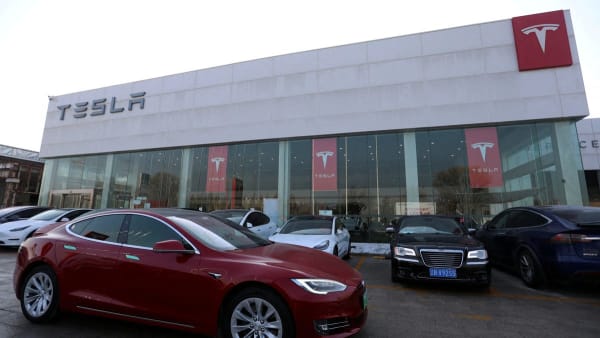Tesla's Global Price War: A Battle for Market Dominance
Tesla, the electric vehicle (EV) pioneer, is engaged in a fierce global price war, slashing prices in key markets like China, Germany, and the United States. This unprecedented move has sent shockwaves through the automotive industry and raised questions about the company's long-term strategy.

China: A Pivotal Battlefield
China, the world's largest EV market, is a crucial battleground for Tesla. With over 3 million EVs sold in 2023, China accounts for more than a third of Tesla's global sales. However, Tesla has faced increasing competition from domestic Chinese EV manufacturers, such as BYD and Nio.

In response, Tesla has reduced prices in China by 6%-13%, sparking a price war with its rivals. This move has been met with mixed reactions from consumers and analysts. Some laud Tesla's effort to make EVs more affordable, while others worry about potential quality concerns.
Germany: A Market in Transition
Germany, the birthplace of the internal combustion engine, is another key market for Tesla. The country has embraced EVs, and Tesla has been a dominant player there for several years. However, Volkswagen Group, Mercedes-Benz, and BMW are all aggressively investing in EVs, threatening Tesla's market share.
To counter this challenge, Tesla has cut prices in Germany by 1%-17%. This has helped the company maintain its position as the leading EV seller in the country. However, analysts believe that the price war is only just beginning and that Tesla may need to continue reducing prices to stay competitive.
United States: A Test of Loyalty
In the United States, Tesla has a loyal customer base but faces competition from established automakers and new EV startups. Ford, General Motors, and Rivian have all launched competitive EVs in recent years, putting pressure on Tesla's market share.
Tesla has responded with selective price reductions in the US, ranging from 2%-15%. This move is seen as an attempt to maintain its leadership position while also making its EVs more accessible to a wider range of consumers.
Underlying Factors Driving the Price War
Several factors are driving Tesla's price war:
* Declining Battery Costs: EV battery costs have fallen significantly in recent years, making it possible for Tesla to reduce vehicle prices without sacrificing profitability.
* Increased Competition: The EV market is becoming increasingly competitive, with numerous new entrants vying for market share. Tesla needs to lower prices to stay ahead of its rivals.
* Production Efficiency: Tesla has invested heavily in automation and production efficiency, enabling it to produce vehicles at a lower cost. The company is passing these savings on to consumers through price reductions.
* Tesla's Financial Position: Tesla is a financially strong company with ample cash reserves. This allows it to offer aggressive discounts to stimulate demand and gain market share.
Implications for the EV Industry
Tesla's price war has profound implications for the EV industry:
* Increased Affordability: The price cuts make EVs more affordable for consumers, which could accelerate the adoption of electric transportation.
* Intensified Competition: The price war will intensify competition among EV manufacturers, forcing them to innovate and improve their products.
* Market Share Reshuffle: The price war could lead to a reshuffling of market share, with Tesla potentially gaining ground at the expense of rivals.
* Long-Term Sustainability: Some analysts question whether Tesla's price war is sustainable in the long term. If the company continues to slash prices, it could erode its profit margins and damage its brand image.
Tesla's Long-Term Strategy
It remains to be seen how long Tesla will continue its price war. The company is likely to assess the market response and adjust its strategy accordingly. Some analysts believe that Tesla is playing a long game, aiming to capture as much market share as possible now and secure its dominance in the global EV market.
Others argue that Tesla's price war is a desperate attempt to maintain sales volumes as it faces increasing competition. They warn that if Tesla continues to cut prices, it could jeopardize its long-term financial health.
Tesla's global price war is a watershed moment for the EV industry. It has sparked a price war among competitors and raised questions about the company's long-term strategy. While the price cuts have made EVs more affordable for consumers, they have also intensified competition and raised concerns about Tesla's financial sustainability. As the price war continues, the industry will be closely watching Tesla's next moves to determine the future of the EV market.
